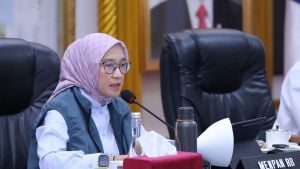Maharashtra Deputy Chief Minister Eknath Shinde recently issued a stern reminder to both his political allies and opponents, cautioning them not to underestimate his influence. Speaking to reporters on February 21, 2025, during his visit to Nagpur, Shinde reflected on his political experience, particularly the pivotal role he played in the 2022 upheaval of the Maharashtra government. "Do not take me lightly. I have already said this to those who took me lightly in the past. I am an ordinary party worker, but I am worker of Bala Saheb and Dighe Saheb..." he stated, emphasizing the weight of his political lineage.
This marked warning came amid speculations of rifts within the ruling Mahayuti alliance, particularly concerning tensions with Chief Minister Devendra Fadnavis. Reports indicate there has been friction over issues such as the management of projects and disputes about ministerial appointments, which have led to increasing scrutiny of Shinde's role and authority.
The backdrop to Shinde's comments included the Maharashtra Chief Minister's Office (CMO) issuing orders for inquiries related to the stalled Rs 900-crore housing project in Jalna. This initiative, originally greenlit during Shinde's previous tenure as chief minister, has faced criticism and controversy since its revival plans were announced. The project, which fell victim to previous government scrutiny, is now under investigation, highlighting the political chess game at play within the state.
Shinde's remarks effectively served as both reassurances to his supporters and stern warnings to his rivals. "When I was taken lightly, I overturned the government in 2022 and brought the government of people's choice," he pointed out. His conviction is rooted firmly in past triumphs; during his first speech post-election victory, he predicted securing over 200 seats alongside Fadnavis—a prediction they met with 232 seats won overall.
But beneath these statements lies the intricacy of the current dynamics between Shinde and Fadnavis. Despite both leaders officially denying any discord, the occurrences suggest otherwise. Shinde’s frequent absence from meetings led by Fadnavis has intensified discussions about possible divisions within the ruling coalition. Both leaders have also set up separate monitoring mechanisms for state projects—a clear signal of growing distance.
This power struggle has reached its peak with the recent conflict over the appointments of guardian ministers for key districts. Shinde's faction has voiced discontent over the allocation of roles, with reports indicating Shinde believes some decisions made under Fadnavis inadvertently marginalize the Shiv Sena's authority.
While Shinde has publicly stated there is "absolutely no cold war" between him and Fadnavis, the circumstances appear to tell a different story. "I had said before the elections, Devendra Fadnavis and I would bring over 220 seats. We got 232 seats," Shinde reiterated, signaling his enduring confidence and expectations of recognition within the alliance.
Further fueling conjecture about growing tensions was Shinde's own recent brush with threats, which he addressed distinctly. A death threat he received via email, ostensibly intending to intimidate him, was brushed aside by Shinde, who expressed resilience against such challenges—"Threats have come before too... I am not afraid of threats..." His history of facing intimidation has only reinforced his image as a steadfast leader willing to confront adversity.
Shinde's ethereal warning, underscored by historical precedent and current disputes, suggests he is acutely aware of the precarious nature of political alliances and the necessity of asserting control. "Those who need to understand this signal should understand it," he concluded, leaving those attentive to Maharashtra's political arena with food for thought.
The complex interplay of ambition, coalition governance, and historical reference when it come to political maneuvering suggests significant consequences for all parties involved. Shinde's clarion call resonates not only as encouragement but also as caution, urging necessary heed to his future contributions to Maharashtra's political fabric.



